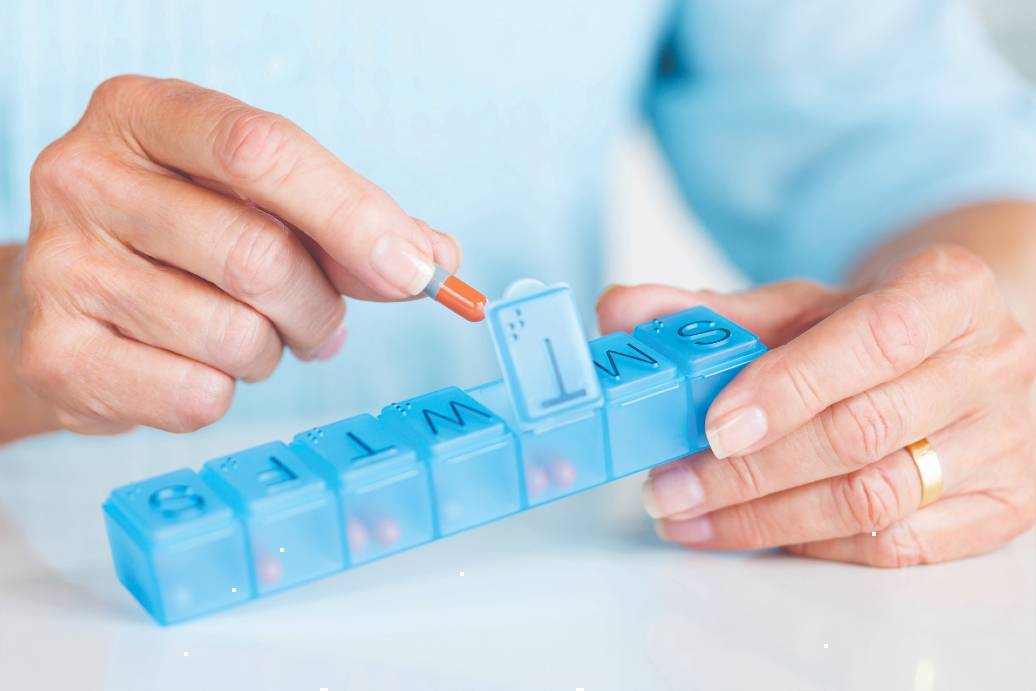
Medication Management: A Guide for Seniors
As we live longer and find new ways to treat chronic illnesses, knowing proper medication management for seniors is vital for your loved one’s health. But what is medication management? Designed to help seniors take their medications on time, all the time, medication management helps avoid the dangers of incorrect administration of meds.
What are the benefits of medication management and why is it so important? According to research by the National Institutes of Health, it’s estimated that on average, 50% of patients in the U.S. do not take their medications for chronic conditions correctly. And compliance rates for senior patients averages less than 45%. Not taking medication as prescribed can result in disease progression, reduced functional abilities and a lower quality of life. According to the CDC seniors go to the emergency room almost 450,000 times a year for adverse drug events (ADE) because their blood thinner, diabetes, seizure or pain medications weren’t monitored carefully.
According to a study, about 80% of seniors regularly take at least two prescription medications, and 36% regularly take at least five prescription drugs. These rates are even higher when over-the-counter drugs, vitamins, and supplements are included. With numbers like these, it’s easy to understand the importance of managing medications for seniors and helping your loved one get organized. Here are some tips on medication management for seniors and their caretakers:
8 tips for managing medication for seniors.
- Catalog all medications: To prevent negative drug interactions, it’s important to know exactly what medications your loved one is taking. Write down the names and dosages of all their medications and how frequently they take them. Include over-the-counter drugs, vitamins, and herbal supplements, too. If they see multiple doctors, it may be helpful to write down who prescribed each medication and what it treats. At your loved one’s next appointment with their primary care physician, go over their list.
- Organizing medications: Organization is essential to good caregiver medication management. Use a pill organizer that’s large enough to allow your loved one to pre-sort their medications for the week. If any pills need to be split, it’s best to do this ahead of time and include those halves in the pill organizer compartments. Simple pill splitters and available at most drug stores and pharmacies.
- Mind your meds: With so many medications, it can be tough to remember when to take each dose. A medication reminder system and tracking log can help your loved one know that they’ve taken the correct meds at the right times. You can create a simple chart with the medication name and dose, day, and time of day. As your loved one takes each dose, record it with a checkmark. Keeping a routine can also help them remember when to take which pills. Some people make it a habit to take certain medications with certain meals. There are even tech-enabled, pillboxes and dispensers and smartphone reminder apps.
- Check for negatives: If your loved one is taking multiple medications, vitamins, over-the-counter medications, or supplements it’s important to double-check to make sure none of them will cause negative drug interactions. To ensure there aren’t any interactions that the doctor or pharmacist could have missed, try this online drug interaction checker from AARP. If you find some possible drug interactions, rather than attempting to make changes on your own, call the doctor or pharmacist for advice right away.
- Side effects: Ask your loved one’s doctor about possible side effects before they start taking a new drug. Be sure to follow up with your family member to see if they’ve noticed any differences in how they’re feeling since starting their new medication. Certain drugs may affect your parent in different ways, including changes in weight, sleep patterns, hunger, or balance. Contact their doctor if they experience any side effects.
- Doctor’s orders: To minimize the risk of negative drug interactions, side effects, or reducing the drug’s effectiveness, it’s absolutely essential to follow the doctor’s instructions. Make sure you and your loved one understand which medications are safe to take at the same time and which need to be spaced out to prevent negative side effects.
- Plan for refills: With long-term prescription medications, it’s essential to get refills on time so your loved one doesn’t run out and miss doses. The most convenient solution is to ask the doctor to prescribe a 90 day supply through a mail-order pharmacy. That way, the medication will be mailed and you’ll only need to remember to re-order every few months. Many pharmacies also offer automatic refills and will notify you when the prescription is ready to be picked up. Some even have prescription delivery services.
- Medication storage: While it’s common to keep medications in the bathroom, the moisture and heat can affect a drug’s effectiveness. In general, medication should be kept in a cool dry place that’s away from children and pets.
Discover the freedom to do more.
At The Chesapeake, we offer a variety of care levels — including assisted living. With services like 24-hour assistance with activities of daily living, medication management, and on-site licensed nursing staff available around the clock, you’ll have the support you need to get more out of life. To learn more, contact us here. One of our retirement counselors will be in touch with you soon.

